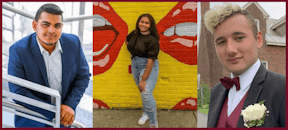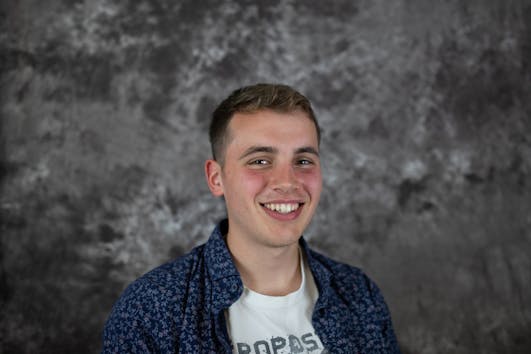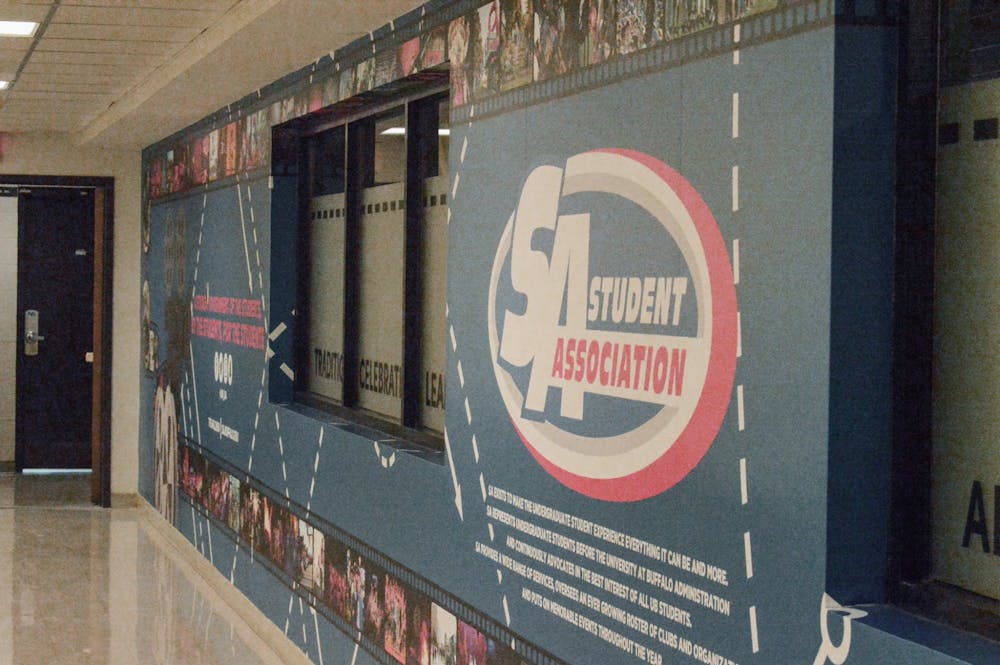Nicholas Singh, Montana Desabio and Austin Wolfgang were all elected last April to serve as members of the SA e-board for the 2021-2022 academic year.

The Spectrum sat down with the current e-board and their chief of staff, Will Eaton, to discuss what they’ve done so far, what they hope to achieve moving forward and their experience working together.
Sections of the interview pertaining to SA advocacy, fest production, clubs and the revocation of some students’ F-1 visas have been removed from this Q&A. Readers can find information about these topics on The Spectrum’s website.
The following has been lightly edited for length and clarity:
The Spectrum: So, you guys have been at this job for five months now. What have you been up to?
Nicholas Singh: “The first thing was actually assessing the SA’s current situation and how we could meet the needs of students. So with that being said, I think we spent the first month and a half really getting a fair idea of what students are really lacking, what they need and what we should put more resources into. It is a learning process as we’re going along, especially with the university in reference to COVID-19 regulations. All summer, we didn’t know anything until the week before [school started]. Even though some sort of normality is available, we still have a lot of obstacles preventing us from doing a lot of events like, for example, the carnival. We went through a lot of roadblocks just to make that happen. It was a lot of planning. It took maybe twice as much resources, planning and execution [than it would’ve in a normal year].”
TS: You talked a lot about student needs and what students were lacking. How did you get that information?
NS: “Firstly, our Media and Marketing team put out surveys to hear from the students about what they want. We started to meet with other organizations on campus, such as RHA [Residence Hall Association]. And I have my monthly call with all the other student government presidents. So it’s a lot of joint collaboration, working with everyone on campus. And most of the time, bi-weekly, we table downstairs [in the Student Union] just to get students’ feedback. Even if we don’t have an event coming up, we still table to try to understand exactly what the students are feeling. ...At the end of the day, we go through the same pain as all the other students, it’s just we are in a position to try to streamline that and make it much more approachable for students.”
Will Eaton: “In addition to all that, our Student Affairs director Josephina Nimarko and our assistant director of health and wellness, Cole Fredericks, they've all been putting in hours since the beginning, pretty much. They’ve been reaching out to people on campus, trying to get the pulse of what students need, and we’re trying to get on top of that as best we can.”
NS: “So Cole, Josie, all of them have been meeting with relevant campus officials, like the director of health and wellness, among others. ...We’re trying to join with everybody [on campus]. ...We’re just testing out how we could work best together, rather than alone. We’ve been elected for months, but for the last few months we’ve been assessing exactly what the department does within. And things always change. There’s a lot of stuff changing, so we might plan something today, and tomorrow something else happens.”
TS: Just to circle back to something you mentioned, where were you putting out those surveys, and how many students responded to them?
NS: “So, we sent out surveys on our Instagram, we gave out flyers downstairs [in the Student Union]. I don't have the exact number of students on me. ...And we plan to do more outreach stuff, especially now that we kind of have a better idea as to the direction we're going. So, we plan to do more interactive stuff.”
TS: Do you have anything specific in the works?
NS: “At the moment, I guess not. Right [now] everything is being considered as to find the best avenue, whether it be typical mainstream stuff like Instagram or whether it be that each month we hold one town hall or whether it be X, Y or Z.”
TS: Nick, you didn’t have a platform when you were running for president. Do you have a platform or long-term goals?
NS: “We need to move away from the overall idea of ‘policing,’ and more toward the idea of ‘helping.’ So that was my first thing, rebuilding SA internally. Which departments are actually working? Where are we spending X amount of dollars? Why are we spending it? Answering those questions took two months, and I’m still learning. The second thing is connecting with students. It doesn’t make sense for us to be doing all this advocacy work, or trying to plan events, or always helping our clubs, or X, Y and Z, if the people we are doing it for don’t believe in us. I know SA has been through a lot, so I’m trying to regain that trust. And we’ve been trying that. I personally went to over 20-something club meetings already in the evenings, and I made it clear to my staff that by the end of the semester, we all must attend meetings with 150 clubs. It doesn’t make sense for us to be doing all this work if we don’t know what the problem is. And then thirdly was actually making a difference on campus. When we all ran for election, we all wanted to make a difference. We don’t want to make a difference that only lasts a month or one year, it should be a long-term, meaningful impact. And I do think mental health is something I’m gonna put a lot of time in. That’s why I’m doing my research properly. So, I’m actually making a difference on campus. Now, I know it’s three vague points, but believe me, I’ve been learning and I’ve been going along to set up SA in such a manner that our changes are here for longevity. We’re making sure that the programs we started stay so that when the next e-board comes in, it’s able to continue to grow and actually grow with the students. That way, each year, when a new e-board comes in they aren’t doing so with a one-year plan. I do believe SA is for the students, by the students. And we need to remember that part, ‘for the students.’ We will put them first. Whatever they want, that’s what we’re providing, regardless of whether we have a policy or not. If they want something but a policy prevents us from following through, the question is, ‘How do we fix this policy to make it work for them?’ And it shouldn't be the other way around.”
TS: Can I push a little bit on your point about restructuring SA? What does that specifically look like?
NS: “Sure, so the first thing I did when I came in was assess each department. Collectively, we have 64 staff [members], I think. We run with an Entertainment Department, Production Department, Media and Marketing Department ...and then come over to the student advocacy side of things. We run the kayak services, but now we’re looking into, during winter, what new program we could do, what new stuff we can start. So when I say, ‘restructuring,’ it’s like looking at all the internal runnings of SA, and asking if it makes sense. Is it really beneficial and is it really working to help these students? And I’m still looking at job descriptions of each staff [position], I'm creating new positions and removing them accordingly. So that’s what I mean by restructuring: making sure that the way we have formed is beneficial to the students.”
TS: None of the three of you ran together in the SA elections. I don't know when’s the last time that happened. What have your relationships with each other been like?
Austin Wolfgang: “Well, first I will say it actually hasn’t happened in SA history before because — I believe it was the 2019 school year [when] we changed it — the president and the vice president used to always run together, so you had to run together and now they run separately. But yeah, it’s been an interesting dynamic.”
Montana Desabio: “I think it’s been really interesting because we’re different ages. We all have this new perspective [because we work together]. I’m coming in as someone who came from online school, and Nick’s been in school for longer than I have [been] here. We’re all really good at compromising, and I think we all are here for the students, so the fact that we all have the same goal, really helps us work well together.”
NS: “It’s been really dynamic, I would say. Especially because I came in with the mindset of like, ‘Ok, let’s do this, this and this’ based on what I experienced, while Montana brought a whole new perspective, like, ‘Hey Nick, I’ve never touched campus. I don’t know what this is.’ So that was nice. And then Austin sees things very differently than I do sometimes. And it’s nice because it makes us stop to think.”
MD: “We all touch [on] a different perspective [within] the student body, which then is good for all of us because then it brings all the students together.”
NS: “Honestly, it’s been interesting because none of us knew each other before. The first time we met was downstairs [outside the Student Union] by the food truck. I was getting mac and cheese. Montana was waiting, Austin was [there]. (Maybe I’m wrong, I think they both met [each other] before me.) And it was just like, ‘This is going to be an interesting journey.’ But we’ve learned how to work with each other and balance out each other.”
MD: “We make each other think.”
NS: “And I think we respect each other, to the point that we’ll call each other and say, ‘Hey, I don’t like this. What do you think?’ So I would say it’s an interesting but beneficial dynamic in reference to actually meeting students’ needs. Montana [works] with all the clubs, and I am going to tell you, she does a great job with all the clubs. Austin does everything [financial]. ...It’s so much stuff, and we’ll help balance [it with] all the staff. I [would] want to pick this team again.”
TS: Nicholas, your vice presidential running mate, Stephen Holguin, lost to Montana. It seems like you've moved forward from that, but was that disappointing at first and how did you move forward from that?
NS: “At the end of the day, I believe we work for the students and if that’s what they think is best, then I support it, regardless of my opinions.”
AW: “And as the third one in that, I was a little worried that they were going to be two best friends and then just me. It worked out a little bit for me!”
TS: I did notice that you already went through your legal fees budget, and had to add $20,000 to that. Is that normal? Why was that the case?
AW: “I think at this point, we’re not going to comment on that just because I would want to talk to my lawyer before commenting on what the lawyers are working on.”
NS: “But what I would say [is that] we provide legal services for all students, undergraduate or graduate. We did re-interview our lawyer, we did do pre-screening. But [we provide] legal services for all students in a variety of topics. They just make an appointment online, and the lawyers advise them accordingly.”
TS: As I recall, there are still some empty seats on the SA Senate that were not filled because you didn’t get enough people to [run for election to] fill all the seats.
AW: “I believe there are still five vacancies on the Senate. And those are all in directly elected positions. All the ex-officio positions are filled at this point.”
TS: Was that disappointing at all, to see a low level of interest?
AW: “We had more than enough students who signed out petitions, and we had a couple who were close to getting [the necessary number of signatures], they just unfortunately did not make it before the deadline. It was definitely a bit of a disappointment for me especially because I was the head of the [SA Assembly in the] legislative branch last year, so I was really hoping we would have a full Senate. But we’re looking at also appointing people, so we can get back to that full Senate and give as many students [as possible] the opportunity to be a part of it.”
TS: What’s the Assembly up to this semester?
AW: “Oh god. So, at the end of the year, the previous e-board and our lawyer came to me and said, ‘Hey, this whole bicameral legislature thing is not really working out because neither body has enough people to actually meet.’ So, we decided to combine the Assembly and the Senate last year. This was probably one of the last things Nelaje [Branch] did as president was to approve that bylaw amendment, combining the two. It was definitely a very tough choice for me, but especially considering we only had four people running [for SA Senate], it definitely was the right choice.”
TS: What has your relationship with the administration been like, especially as it pertains to mental health?
NS: “It’s been a good one, I would say, so far. [We’ve been] having meetings and discussing stuff, it’s been good. The first month of school was more about understanding what we are going to ask for. If you look at all the issues on campus, it’s near impossible to solve it all in a year. I wish we could. [We were] just having meetings and seeing who really will be our ally, and who would help us through whatever. So far, I would say it’s been pretty good working with the vice president [for student life]’s office. It should be pretty OK, continuing, once we actually come forward [with exactly what we want].”
Grant Ashley is a senior news/features editor and can be reached at grant.ashley@ubspectrum.com

Grant Ashley is the editor in chief of The Spectrum. He's also reported for NPR, WBFO, WIVB and The Buffalo News. He enjoys taking long bike rides, baking with his parents’ ingredients and recreating Bob Ross paintings in crayon. He can be found on the platform formerly known as Twitter at @Grantrashley.





